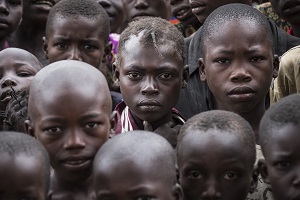UNICEF calls for the urgent protection of children in the Central African Republic
A dramatic increase in violence in the Central African Republic in the first part of 2018 has forced at least 55,000 people, including 28,600 children to flee because of brutality and violence in their communities.

Children gather at the school in Ndenga village, 30 kilometres from Kaga Bandoro, Central African Republic. As of October 2017, violent clashes and inter-communal tensions fuelled by armed groups have continuously increased in the country.
The already precarious humanitarian and security situation in the country has deteriorated over the past year, worsening even further since the start of 2018. There are currently an estimated 687,400 internally displaced persons, up from 440,000 in 2017, including more than 357,400 children who lost access to education, health and protection services.
“Children are paying the highest price for this new surge of violence. All actors should stop violence against children now!” said Marie-Pierre Poirier, UNICEF Regional Director for West and Central Africa, on a five-day visit to the Central African Republic. “The world must not forget the children of the Central African Republic. Protection of children should come first.”
Beyond the immediate risks to increased violence, the situation of children in the country remains critical. A third of children are currently out of school. Close to half of all children are not fully immunized and 41 per cent of children under the age of five suffer from chronic malnutrition.
At least 2.5 million people, including 1.3 million children, are in need of urgent humanitarian assistance, but resources are severely limited. As of the end of April, only 15 per cent of UNICEF’s 2018 humanitarian appeal has been funded. The agency needs an additional US$48 million to keep providing life-saving assistance to children and families in the country.
UNICEF is providing children with life-saving assistance including basic health care, specific support for victims of sexual violence and abuse, and access to temporary learning spaces in internally displaced camps.
In 2017, as part of the response to the Lake Chad basin polio outbreak, more than 800,000 children under-five were vaccinated against polio, representing 98 per cent coverage. In addition, over 26,000 children suffering from severe acute malnutrition were treated, with a recovery rate of 90 per cent.
In 2017 alone, UNICEF supported the release of 2,969 children from armed forces and groups. As part of its humanitarian emergency response, UNICEF helped set up 315 child-friendly and temporary learning spaces in displacement camps, reaching more than 56,600 children.
“With significant investment in targeted interventions, we can make a real difference for children both in internally displaced sites and host communities. UNICEF and our partners are achieving encouraging results focusing on four key priorities: scaling up immunization, ending malnutrition, providing education, and protection, including in emergency situations,” said Poirier. “We need support to take this to scale with our partners.”
Source:United Nations Children's Fund
- 195 reads
Human Rights
Ringing FOWPAL’s Peace Bell for the World:Nobel Peace Prize Laureates’ Visions and Actions

Protecting the World’s Cultural Diversity for a Sustainable Future

The Peace Bell Resonates at the 27th Eurasian Economic Summit

Declaration of World Day of the Power of Hope Endorsed by People in 158 Nations

Puppet Show I International Friendship Day 2020

